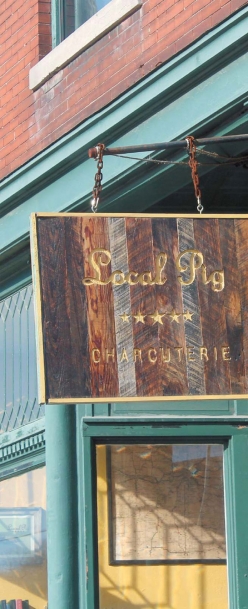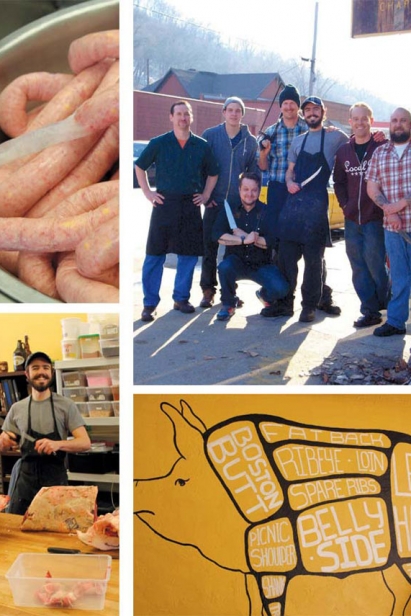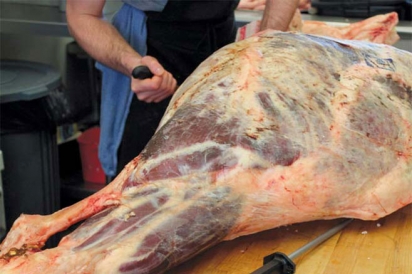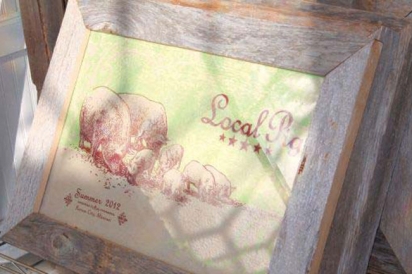Local Pig: Butcher in the Bottoms
It’s probably a good thing that Alex Pope couldn’t raise enough money to start his own restaurant in Kansas City after working as a highly creative chef at R-Bar and The American Restaurant. Because then there wouldn’t be the cheerful Local Pig, an artisanal butcher shop with bright yellow walls, old-time glass display cases and the enlightened motto: “Happy animals make a superior meat product.”
The shop sells humanely raised pork, beef, chicken, duck and goat plus an assortment of other goods. It’s no surprise, though, positioned in the middle of serious barbecue territory, that the namesake delivers the biggest sales. “There’s just something primal about a pig,” says Pope.
Located in a former saloon and post office at 2618 Guinotte Avenue, Local Pig celebrated its first anniversary in March by opening an on-site food truck permanently stationed between the store and four picnic tables. The truck, dubbed Pigwich, sells sandwiches to walk-up customers including Pope’s East Bottoms industrial neighbors: several factories, a rail switching yard and a fish market. One block north is the blues bar Knuckleheads.
Pope earned a degree in economics at the University of Wisconsin before changing course and enrolling in the Institute of Culinary Education in New York City. He owns Local Pig along with investor Matt Kafka, and is pleased with the shop’s early success. It was a risk, but one carefully executed. “I don’t make graphs or anything, but a knowledge of basic business tools is helpful,” he says. “Some chefs focus only on the artistic side of food, but I’ve always understood how to make money in a business.”
Not that he hasn’t done some artistic and crazy stuff in the past, like flavoring vinaigrette with boiled bubblegum and shooting beet puree onto white dinner plates with a paintball gun while preparing food for Kansas City’s first pop-up restaurant. He still self-identifies as a chef and does some catering for private parties. But right now his attention is focused on something more extreme than playful food antics—maintaining a steady supply of heritage and pastured meat from Missouri and Kansas farmers. In addition to selling various butcher cuts, he also offers sausage, pate, potpies and tamales. Recently he added a wholesale distribution business selling meat to metro area restaurants.
“What most people don’t realize is how radical it is to create this kind of local supply chain. We consider ourselves totally off the food grid that supplies more than 95 percent of the meat Americans consume,” Pope says. He put in plenty of work to get to that point, visiting some two dozen farms to find producers who are raising animals in a natural way and selling at a price they can both agree on. He started with a guidebook from the Kansas City Food Circle, a nonprofit organization that connects local organic and free-range growers with consumers, chefs and grocers. “It was an enormous resource,” he says. “I literally called every farmer on the list.”
A handful of farmers now supply Pope with pigs, poultry, lamb and goats. He buys grass-fed beef from a variety of other sources. “The commodities market is incredibly vertically and horizontally integrated,” he observes. “You either see giant confinement operations with thousands of hogs or you have small farmers raising four to six animals. There’s nothing between.”
Now, after a year in business, he is especially proud of his staff, who include former chefs, culinary school graduates and an electrician. “They’re amazingly committed to this place,” he says. “I can train anyone, but they have to have the right attitude.” Beyond customer service, Pope maintains a certain right attitude toward animals, and is committed to using only those that have been allowed to express what he calls “their animalness.”
“Pigs don’t want to be in a metal cage,” he says. “They want to be rooting in the dirt. Chickens want to be pecking around in the yard.
“We use the word ‘local’ in the place of ‘humanely raised.’ We’re not trying to shame anyone, and our products are not cheap. But if you would like to travel down that route, we’re here.”








